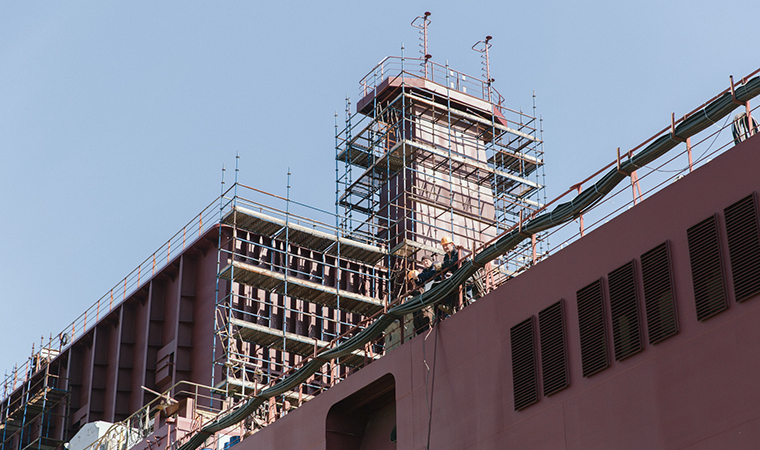
FNPS prepared for tests
back to contentsThe floating nuclear station will be a power source for large production facilities, ports and offshore platforms. Many countries recognize the need for mobile nuclear stations and work on their creation, but Rosatom outperforms its overseas competitors.
The 170-meter station is almost finished – accommodations for the 78-strong crew have been built, and so have storage compartments for fresh and spent nuclear fuel. There are only minor works left, according to FNPS Chief Constructor Alexander Kovalyov.
Since it is the first ever floating nuclear station, priority is given to reliability, safety and meticulous in-plant testing, stresses Sergei Zavyalov, Rosenergoatom’s Director for FNPS. According to him, the first FNPS is comparable to the Arktika flagship nuclear icebreaker (now under construction at the same Baltic Plant) in terms of technology, complexity, steel consumption and other parameters. However, FNPS construction costs are 30% lower than the cost of Arktika. “We hope that the next floating unit will be at least 25% cheaper,” adds Sergei Zavyalov. Experts believe that electricity generated by the FNPS will be more affordable than that of oil, gas or coal fired power stations.
Designers keep working on the project. “A few customers need reactors as powerful as the Akademik Lomonosov has, and able to carry huge stocks of fresh and spent nuclear fuel. But we want to make floating stations with lesser displacement,” explains Sergei Zavyalov. For example, next generation FNPS will be saved from spent nuclear fuel, other nuclear waste and fuel handling equipment as there is a potential opportunity to use the RITM-200 reactor designed for nuclear icebreakers. It will help automate some of the functions, reduce staff numbers and optimize project costs. “We will produce small-size, cheap floating stations designed for the only purpose of power generation and transmission. Lead times will decrease manifold as soon as the production processes are streamlined,” Sergei Zavyalov concluded.
Standardized production will boost interest of overseas customers. Rosatom will be able to enter international markets with the new product when the reference FNPS project is operational. The Earth has hundreds of islands and remote areas which need electricity, heat and water desalination. Talks with potential customers are already underway.




